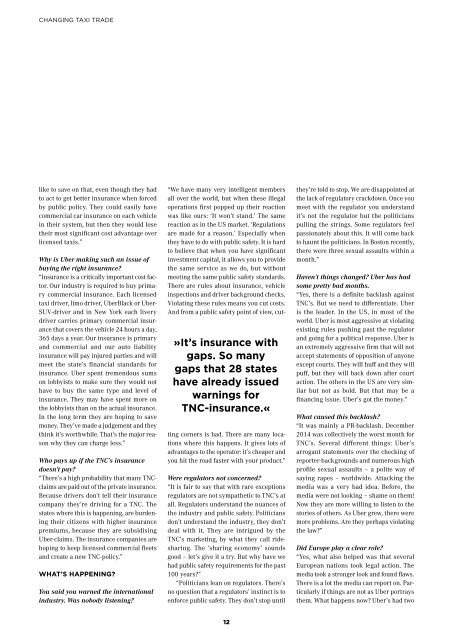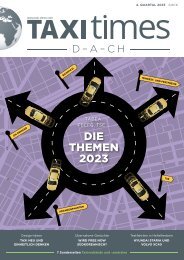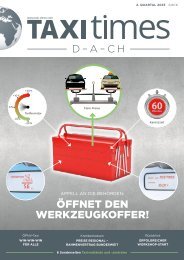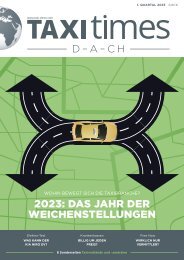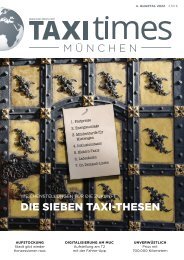You also want an ePaper? Increase the reach of your titles
YUMPU automatically turns print PDFs into web optimized ePapers that Google loves.
CHANGING TAXI TRADE<br />
CHANGING TAXI TRADE<br />
like to save on that, even though they had<br />
to act to get better insurance when forced<br />
by public policy. They could easily have<br />
commercial car insurance on each vehicle<br />
in their system, but then they would lose<br />
their most significant cost advantage over<br />
licensed taxis.”<br />
Why is Uber making such an issue of<br />
buying the right insurance?<br />
“Insurance is a critically important cost factor.<br />
Our industry is required to buy primary<br />
commercial insurance. Each licensed<br />
taxi driver, limo driver, UberBlack or Uber-<br />
SUV-driver and in New York each livery<br />
driver carries primary commercial insurance<br />
that covers the vehicle 24 hours a day,<br />
365 days a year. Our insurance is primary<br />
and commercial and our auto liability<br />
insurance will pay injured parties and will<br />
meet the state’s financial standards for<br />
insurance. Uber spent tremendous sums<br />
on lobbyists to make sure they would not<br />
have to buy the same type and level of<br />
insurance. They may have spent more on<br />
the lobbyists than on the actual insurance.<br />
In the long term they are hoping to save<br />
money. They’ve made a judgement and they<br />
think it’s worthwhile. That’s the major reason<br />
why they can charge less.”<br />
Who pays up if the TNC’s insurance<br />
doesn’t pay?<br />
“There’s a high probability that many TNCclaims<br />
are paid out of the private insurance.<br />
Because drivers don’t tell their insurance<br />
company they’re driving for a TNC. The<br />
states where this is happening, are burdening<br />
their citizens with higher insurance<br />
premiums, because they are subsidising<br />
Uber-claims. The insurance companies are<br />
hoping to keep licensed commercial fleets<br />
and create a new TNC-policy.”<br />
WHAT’S HAPPENING?<br />
You said you warned the international<br />
industry. Was nobody listening?<br />
»It’s insurance with<br />
gaps. So many<br />
gaps that 28 states<br />
have already issued<br />
warnings for<br />
TNC-insurance.«<br />
“We have many very intelligent members<br />
all over the world, but when these illegal<br />
operations first popped up their reaction<br />
was like ours: ‘It won’t stand.’ The same<br />
reaction as in the US market. ‘Regulations<br />
are made for a reason.’ Especially when<br />
they have to do with public safety. It is hard<br />
to believe that when you have significant<br />
investment capital, it allows you to provide<br />
the same service as we do, but without<br />
meeting the same public safety standards.<br />
There are rules about insurance, vehicle<br />
inspections and driver background checks.<br />
Violating these rules means you cut costs.<br />
And from a public safety point of view, cutting<br />
corners is bad. There are many locations<br />
where this happens. It gives lots of<br />
advantages to the operator: it’s cheaper and<br />
you hit the road faster with your product.”<br />
Were regulators not concerned?<br />
“It is fair to say that with rare exceptions<br />
regulators are not sympathetic to TNC’s at<br />
all. Regulators understand the nuances of<br />
the industry and public safety. Politicians<br />
don’t understand the industry, they don’t<br />
deal with it. They are intrigued by the<br />
TNC’s marketing, by what they call ridesharing.<br />
The ‘sharing economy’ sounds<br />
good – let’s give it a try. But why have we<br />
had public safety requirements for the past<br />
100 years?”<br />
“Politicians lean on regulators. There’s<br />
no question that a regulators’ instinct is to<br />
enforce public safety. They don’t stop until<br />
they’re told to stop. We are disappointed at<br />
the lack of regulatory crackdown. Once you<br />
meet with the regulator you understand<br />
it’s not the regulator but the politicians<br />
pulling the strings. Some regulators feel<br />
passionately about this. It will come back<br />
to haunt the politicians. In Boston recently,<br />
there were three sexual assaults within a<br />
month.”<br />
Haven’t things changed? Uber has had<br />
some pretty bad months.<br />
“Yes, there is a definite backlash against<br />
TNC’s. But we need to differentiate. Uber<br />
is the leader. In the US, in most of the<br />
world. Uber is most aggressive at violating<br />
existing rules pushing past the regulator<br />
and going for a political response. Uber is<br />
an extremely aggressive firm that will not<br />
accept statements of opposition of anyone<br />
except courts. They will huff and they will<br />
puff, but they will back down after court<br />
action. The others in the US are very similar<br />
but not as bold. But that may be a<br />
financing issue. Uber’s got the money.”<br />
What caused this backlash?<br />
“It was mainly a PR-backlash. December<br />
2014 was collectively the worst month for<br />
TNC’s. Several different things: Uber’s<br />
arrogant statements over the checking of<br />
reporter-backgrounds and numerous high<br />
profile sexual assaults – a polite way of<br />
saying rapes – worldwide. Attacking the<br />
media was a very bad idea. Before, the<br />
media were not looking – shame on them!<br />
Now they are more willing to listen to the<br />
stories of others. As Uber grew, there were<br />
more problems. Are they perhaps violating<br />
the law?”<br />
Did Europe play a clear role?<br />
“Yes, what also helped was that several<br />
European nations took legal action. The<br />
media took a stronger look and found flaws.<br />
There is a lot the media can report on. Particularly<br />
if things are not as Uber portrays<br />
them. What happens now? Uber’s had two<br />
PHOTO: Wim Faber<br />
bad months and they’re rebounding. They<br />
invited journalists to cocktails, beefed up<br />
staff with seasoned professionals who<br />
could help them find a way out of this. My<br />
message: obey the law as the TNCs do in<br />
New York. Fingerprint drivers, let the public<br />
authorities inspect your vehicles, and<br />
pay the same taxes and fees as other operators.<br />
They can operate within the law in<br />
New York. So why can’t they follow the law<br />
in all other cities? The new people they’re<br />
bringing into Uber should convince the<br />
CEO and others that obeying the law is not<br />
such a bad idea.”<br />
Were you envious of those European<br />
countries?<br />
“Yes, I was envious of the rest of the world.<br />
It made me disappointed in our own politicians<br />
and judicial process. Uber has the<br />
right to change the law, to work within the<br />
rules. But to operate with the thinly veiled<br />
excuse that ‘we are different, the rules<br />
don’t apply to us.’ We take heart that other<br />
countries respect their laws and apply<br />
them. We hope that our politicians learn<br />
from that.”<br />
“It’s also a slippery slope. Uber urged<br />
drivers to provide unlicensed taxi service<br />
for several years and now, in the few communities<br />
where they have convince the<br />
politicians to make UberX legal, Uber now<br />
tells those same drivers that they cannot<br />
pick up on the street. Uber doesn’t want<br />
them to pick up off-app on the street,<br />
because Uber won’t get its 20% fee. Isn’t it<br />
surprising that drivers will still create<br />
ranks? And try to get work on the streets<br />
illegally – without the app? Here the TNCs<br />
have created a problem for themselves and<br />
it will not easily be remedied.”<br />
Are there Uber-ranks?<br />
“Absolutely! Uber drivers sit outside the<br />
major restaurants and entertainment centres<br />
in Washington DC. ‘Do you want a<br />
ride, sir?’ It’s a standard practice with<br />
many UberX drivers. Difficult to stamp out.<br />
ALFRED LAGASSE<br />
Al LaGasse, (60) CEO of the <strong>Taxi</strong>cab Limousine & Paratransit Association<br />
(TLPA) in Rockville, Maryland (USA), joined the organisation in 1978 with<br />
a degree in Business Administration from the George Mason University.<br />
LaGasse is probably the longest serving CEO of any taxi association. His<br />
political and management skills and in-depth knowledge of the US industry<br />
made TLPA the leading authority in the US taxi, limousine and paratransit<br />
sector and him the long-time favourite of TLPA’s membership.<br />
Uber is also limiting their liability. Uber<br />
admits that when you’re not going through<br />
the app you’re not insured in any way.”<br />
What would you recommend operators<br />
do?<br />
“It’s difficult but very important to objectively<br />
examine your own services. Make<br />
sure you deliver the service the public<br />
needs. Look at your own technology. Major<br />
firms all have apps of which the quality is<br />
good. The message about enforcing the law<br />
hasn’t worked well in the US. Now our message<br />
is mainly a public safety message. You<br />
also need position papers that explain our<br />
industry in simple and direct terms. The<br />
media doesn’t understand the industry and<br />
the issues. Neither do politicians.”<br />
“The more consensus you build within<br />
the industry, the better. In every city they<br />
go into the TNC’s have a plan. We are not<br />
one company. Every city has different<br />
requirements. We don’t have a cookie<br />
cutter response to their cookie cutter<br />
12 TAXI MARCH / <strong>2015</strong><br />
13


